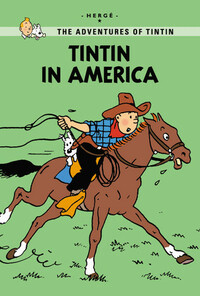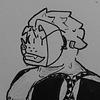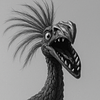Take a photo of a barcode or cover
This was one of my top 3 Tintin books growing up - mostly because I was obsessed with anything involving Native Americans, horses, and so on. Still, said obsession notwithstanding, Tintin in America is a great installment of the boy reporter's adventures. Herge has a talent for combining history, humor, and adventure in his stories; I still say to this day that everything I learned about Al Capone, I first read in Tintin in America. Quality book.
I cannot wait to get to the later volumes of this wherein it's less racist and we also get Captain Haddock lmao. A fun romp of a time, Tintin getting into shenanigans and making miraculous escapes as is tradition. But yeah, What A Depiction Of Indigenous Americans, especially after I so recently read The Only Good Indians by Stephen Graham Jones and actually read some proper representation for once haha.
lighthearted
fast-paced
Plot or Character Driven:
Plot
Strong character development:
No
Loveable characters:
No
Diverse cast of characters:
Yes
Flaws of characters a main focus:
No
adventurous
funny
lighthearted
fast-paced
Plot or Character Driven:
Plot
Strong character development:
No
Loveable characters:
Yes
Flaws of characters a main focus:
No
adventurous
fast-paced
Plot or Character Driven:
Plot
Strong character development:
No
Loveable characters:
No
Diverse cast of characters:
Complicated
Flaws of characters a main focus:
No
adventurous
funny
lighthearted
mysterious
fast-paced
Plot or Character Driven:
Plot
Strong character development:
No
Loveable characters:
Complicated
Diverse cast of characters:
Complicated
Flaws of characters a main focus:
No
Well, at least he looks awfully cute in that bellboy’s outfit.
Tintin in America is undoubtedly an improvement on in the Land of the Soviets and in the Congo. The most obvious difference is the art, where in the 1945 version Hergé's clear line comes into focus. It's also clear that the edited-down book version has put a dent in the problem of pacing (although it's far from fixed). And although Hergé was not free to choose his subject for this story, it's a sight better than the previous two in terms of its orientation to its subject and audience. Maybe it's because “greed is bad” is a much more agreeable and much less condescending soapbox to take up. As a matter of fact, there are plenty of moments in here that pass as cutting satire – for one, the way the Americans arrive on the scene as soon as oil is discovered on the reservation and start trying to lowball Tintin, assuming him the rightful owner.
On the other hand, well, it's still a bit racist, isn't it?
It should be said that this is not the Sinophobic caricatures of Soviets nor the minstrelsy of Congo. In fact, Hergé's sympathies (such as they are) towards native Americans mean he doesn't come off nearly as bad as he could have, although one wonders if that sympathy is contingent on his anti-American attitudes. In any case, he's not completely off the hook here. “Native Americans are being forced out of their homes by Americans looking for oil, but they're also gullible thugs who would kill our beautiful young white men if the right words were simply whispered in their ears” isn't exactly woke. (And simply because there's no better place to put this: what's with the joke about native American dogs doing a microaggression against Snowy?)
Okay, look, I could say “comic’s racist, 4/10.” And believe me, that's not the only strike against it. Even though the pacing's improved, you still get the sense that the story doesn't resolve so much as it just stops. The machinations of the mob are still absurd – Chicago’s gangsters are just as likely to gas you as they are to murder you with a boomerang (I suppose you could argue it inspired that one episode of BBC's Sherlock, and I don't believe the comparison is favorable either way), and the state of Illinois is apparently littered with trapdoors. (I was stunned by the amount of trapdoors. I counted no fewer than three.) I could go on, but I wanted to enjoy a flight of fancy before I call it a night. Wander with me.
What, exactly, is Tintin's job? I mean, yes, he's a reporter, although he does far less reporting here than he did in the USSR. (As best as I can tell, the only journalism he engages in here is taking a picture of a potentially homeless native American man halfway through, which, like…at least throw him a $5 bill.) Actually, he's not even necessarily in America to report, arriving as he does to chase down Actual Real-Life Al Capone. Tintin does quite well for himself in this, managing to wipe out Chicago's organized crime syndicates entirely, handling Capone before the first half of the story is finished and moving onto purely fictional mobsters. It's not even like he's trying to leave by the end! He's only around for the last third because he keeps getting caught in increasingly baroque kidnapping plots! No, if Tintin is any kind of journalist here, it's as a Thompson-esque gonzo journalist, decades before that was a career option. Tintin goes to the land of the Yankees during the Hoover administration and cleans up Chicago.
Perhaps it was better than we deserved.
Tintin in America is undoubtedly an improvement on in the Land of the Soviets and in the Congo. The most obvious difference is the art, where in the 1945 version Hergé's clear line comes into focus. It's also clear that the edited-down book version has put a dent in the problem of pacing (although it's far from fixed). And although Hergé was not free to choose his subject for this story, it's a sight better than the previous two in terms of its orientation to its subject and audience. Maybe it's because “greed is bad” is a much more agreeable and much less condescending soapbox to take up. As a matter of fact, there are plenty of moments in here that pass as cutting satire – for one, the way the Americans arrive on the scene as soon as oil is discovered on the reservation and start trying to lowball Tintin, assuming him the rightful owner.
On the other hand, well, it's still a bit racist, isn't it?
It should be said that this is not the Sinophobic caricatures of Soviets nor the minstrelsy of Congo. In fact, Hergé's sympathies (such as they are) towards native Americans mean he doesn't come off nearly as bad as he could have, although one wonders if that sympathy is contingent on his anti-American attitudes. In any case, he's not completely off the hook here. “Native Americans are being forced out of their homes by Americans looking for oil, but they're also gullible thugs who would kill our beautiful young white men if the right words were simply whispered in their ears” isn't exactly woke. (And simply because there's no better place to put this: what's with the joke about native American dogs doing a microaggression against Snowy?)
Okay, look, I could say “comic’s racist, 4/10.” And believe me, that's not the only strike against it. Even though the pacing's improved, you still get the sense that the story doesn't resolve so much as it just stops. The machinations of the mob are still absurd – Chicago’s gangsters are just as likely to gas you as they are to murder you with a boomerang (I suppose you could argue it inspired that one episode of BBC's Sherlock, and I don't believe the comparison is favorable either way), and the state of Illinois is apparently littered with trapdoors. (I was stunned by the amount of trapdoors. I counted no fewer than three.) I could go on, but I wanted to enjoy a flight of fancy before I call it a night. Wander with me.
What, exactly, is Tintin's job? I mean, yes, he's a reporter, although he does far less reporting here than he did in the USSR. (As best as I can tell, the only journalism he engages in here is taking a picture of a potentially homeless native American man halfway through, which, like…at least throw him a $5 bill.) Actually, he's not even necessarily in America to report, arriving as he does to chase down Actual Real-Life Al Capone. Tintin does quite well for himself in this, managing to wipe out Chicago's organized crime syndicates entirely, handling Capone before the first half of the story is finished and moving onto purely fictional mobsters. It's not even like he's trying to leave by the end! He's only around for the last third because he keeps getting caught in increasingly baroque kidnapping plots! No, if Tintin is any kind of journalist here, it's as a Thompson-esque gonzo journalist, decades before that was a career option. Tintin goes to the land of the Yankees during the Hoover administration and cleans up Chicago.
Perhaps it was better than we deserved.
Graphic: Animal cruelty, Racism, Car accident
adventurous
funny
lighthearted
medium-paced
Plot or Character Driven:
Plot
Strong character development:
No
Loveable characters:
Complicated
Diverse cast of characters:
No
Flaws of characters a main focus:
No
Tintín viaja a las Américas como continuación a sus aventuras en el Congo, para dar caza a la banda del Gangster Al Capone. Se topa con un sistema corrupto y un país sin escrúpulos en el que el dinero mueve las ruedas del progreso.
Comparándolo con el álbum anterior, parece que Hergé comienza a encontrar un lenguaje visual y un argumentario que le permite contar sus historias basadas en gags (de nuevo volviendo a la necesidad de publicar estos tebeos como entregas en revistas) y, al mismo tiempo hacer comentario social. El argumento es, entiendo, secundario a la acción. El objetivo es meter a Tintín y Milú en la mayor cantidad de situaciones pintorescas posible y resolverlas en un par de páginas. En este sentido, creo que este comic es un éxito. Si bien no es mi forma predilecta de contar historias, es cierto que el ritmo es mejor que en Tintín en el Congo y los gags visuales funcionan muy bien. Hergé tiene un par de chistes muy potentes en este album (la sección en la que Tintín encuentra petróleo y, en cinco viñetas y un día de tiempo dentro del comic, se expropia a los nativos, se construye un sistema de explotación y se erige un a ciudad, funciona muy bien a varios niveles).
Hergé parece haber controlado algunos de sus alardes artísticos del álbum anterior a favor de un lenguaje visual muy claro, dinámico y limpio. Casi podrías eliminar todos los bocadillos y seguir la historia sólo con las imágenes.
Con todo, el argumento manido, la repetición de situaciones (cuántas veces tienen que raptar a alguien para que sean suficientes?!) hacen que sea un tebeo algo aburrido de leer. Como nota, parecería que el racismo rampante en la entrega anterior está algo más diluido aquí. Aunque la sección con los nativos americanos roza el insulto, al menos no es abiertamente ofensivo como ocurría con las tribus congoleñas.
Comparándolo con el álbum anterior, parece que Hergé comienza a encontrar un lenguaje visual y un argumentario que le permite contar sus historias basadas en gags (de nuevo volviendo a la necesidad de publicar estos tebeos como entregas en revistas) y, al mismo tiempo hacer comentario social. El argumento es, entiendo, secundario a la acción. El objetivo es meter a Tintín y Milú en la mayor cantidad de situaciones pintorescas posible y resolverlas en un par de páginas. En este sentido, creo que este comic es un éxito. Si bien no es mi forma predilecta de contar historias, es cierto que el ritmo es mejor que en Tintín en el Congo y los gags visuales funcionan muy bien. Hergé tiene un par de chistes muy potentes en este album (la sección en la que Tintín encuentra petróleo y, en cinco viñetas y un día de tiempo dentro del comic, se expropia a los nativos, se construye un sistema de explotación y se erige un a ciudad, funciona muy bien a varios niveles).
Hergé parece haber controlado algunos de sus alardes artísticos del álbum anterior a favor de un lenguaje visual muy claro, dinámico y limpio. Casi podrías eliminar todos los bocadillos y seguir la historia sólo con las imágenes.
Con todo, el argumento manido, la repetición de situaciones (cuántas veces tienen que raptar a alguien para que sean suficientes?!) hacen que sea un tebeo algo aburrido de leer. Como nota, parecería que el racismo rampante en la entrega anterior está algo más diluido aquí. Aunque la sección con los nativos americanos roza el insulto, al menos no es abiertamente ofensivo como ocurría con las tribus congoleñas.
Overall, I rate this book two out of five stars. I feel like I should have read the book when I was younger. It appears absurd that Tintin always manages to escape even in the direst of situations because real life doesn't work like that. Maybe I wouldn't have thought of it that way as a kid. Moreover, the first story is a bit terrible. There isn't even a plot. I get the impression that it's all about him being captured by the enemy and then escaping again and again.
The second and third story, on the other hand, is not at all bad. The two officers in black suits make it bearable for me. They're hilarious, especially the way they always manage to find Tintin but always manage to lose him again and again. It never ceases to amuse me. Moreover, the plot is a bit better than the first story.
However, the way they portray certain cultures is a little stereotypical. And there is so much violence in the story such as gunshots. It may not be a good idea for children to read if they are the target readers but then it may not apply to every child that way.
The second and third story, on the other hand, is not at all bad. The two officers in black suits make it bearable for me. They're hilarious, especially the way they always manage to find Tintin but always manage to lose him again and again. It never ceases to amuse me. Moreover, the plot is a bit better than the first story.
However, the way they portray certain cultures is a little stereotypical. And there is so much violence in the story such as gunshots. It may not be a good idea for children to read if they are the target readers but then it may not apply to every child that way.
adventurous
funny
lighthearted
fast-paced
Plot or Character Driven:
Plot
Strong character development:
No
Loveable characters:
No
Diverse cast of characters:
Yes
Flaws of characters a main focus:
No





